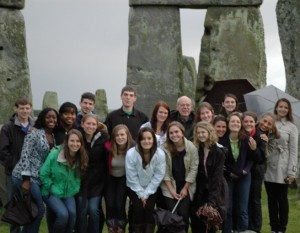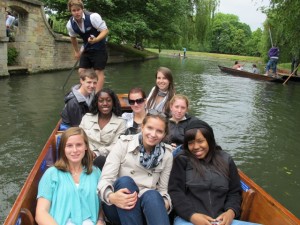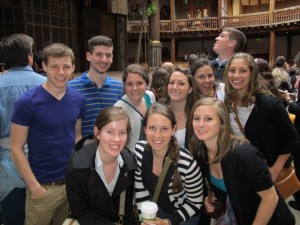
The class at Stonehenge
It’s not every day students get to learn about a foreign healthcare system by rolling up their sleeves and working within the system, but that’s exactly what 19 students did through a summer interim course in London. It’s such a unique experience that each year, the College receives inquiries from students around the country hoping to get in on the study abroad trip.
Housed in an international student dorm in southwest London’s Chelsea neighborhood, each student works 9 a.m.-5 p.m. in an internship setting Monday-Thursday. They meet for their seminar class, Social and Ethical Issues in Healthcare in the U.S. and U.K., on Friday with Alan Childs, professor of psychology, and Stephen Lammers, emeritus professor of religious studies. What makes the internships so unique, explains Childs, is that students are participants, not merely observers.

Students float down the River Cam.
Morgan West ’13 (Huntington Beach, Calif.) worked in a mother-and-baby ward that treats mothers with postnatal depression and other mental illnesses while supporting them in caring for their babies. Because the mothers stay for one month, West was able to form close bonds with them as well as with the clinic’s nurses and doctors. Her supervisors were so impressed with her work that they assigned her to lead a handover meeting where nurses working adjacent shifts inform each other of new developments and patient progress.
“Our course and my internship have completely changed my perspective on healthcare,” says the neuroscience major. “It’s forced me to think about the role of healthcare in each of our lives and how we go about protecting our health. I had the idea that we’d learn about a perfect healthcare system in this course, and I’ve had to accept the reality that perfection in healthcare has yet to be achieved.”

Court No. 1 at Wimbledon
While their internships certainly kept them busy, the group still found time to soak up the cultural and historical aspects of London. A small group got the full tennis experience when it went to the championships at Wimbledon, one of the sport’s premier events. Biology major Carolyn Cabrey ’12 (North Wales, Pa.) counts that as one of the trip’s highlights. They stood in queue for six hours to get into the grounds and enjoyed the traditional strawberries and cream dessert.
The students also visited the Museum of London, National Maritime Museum, Wellcome Library, Roman Baths, Cambridge, Borough Market, Greenwich on the Thames River, and the Globe Theater, where they saw Shakespeare’s Much Ado About Nothing. They visited Stonehenge after hours so they could walk among the stones rather than view them from a distance.
“I can honestly say, without overstatement, that this is usually a life-changing experience for our students on many different levels,” says Childs. “They learn to live and work like a British citizen, navigate and survive in one of the largest and most complex cities in the world, immerse themselves in an ancient culture and a broad range of cultural activities, and gain invaluable experience in a potential career from an entirely new perspective.”
Cabrey says that every day, she learned something new, even about the healthcare system in her own country.

Students at the Globe Theatre
“In the U.S. we are going through huge healthcare reform movements and the U.K. is as well, which is interesting, too,” she says. “This opened my eyes to what universal healthcare is all about and helps me understand what is being proposed for our healthcare system that will affect me and my family.”
For Lammers, who has led semester abroad trips three times in addition to the six times he’s done the London interim course, he gets to see his students in a new light. And, as an ethics consultant for Lehigh Valley Health Network, he is a student himself.
“You are instructor, sometimes the dean, sometimes confidant,” he explains. “You sometimes see them when they are vulnerable. In ways they rarely do on campus, they permit you entry into their lives. That is always a privilege. As an ethics consultant, this visit gives me the time to explore and think about issues situated in another place. I learn a lot.”



